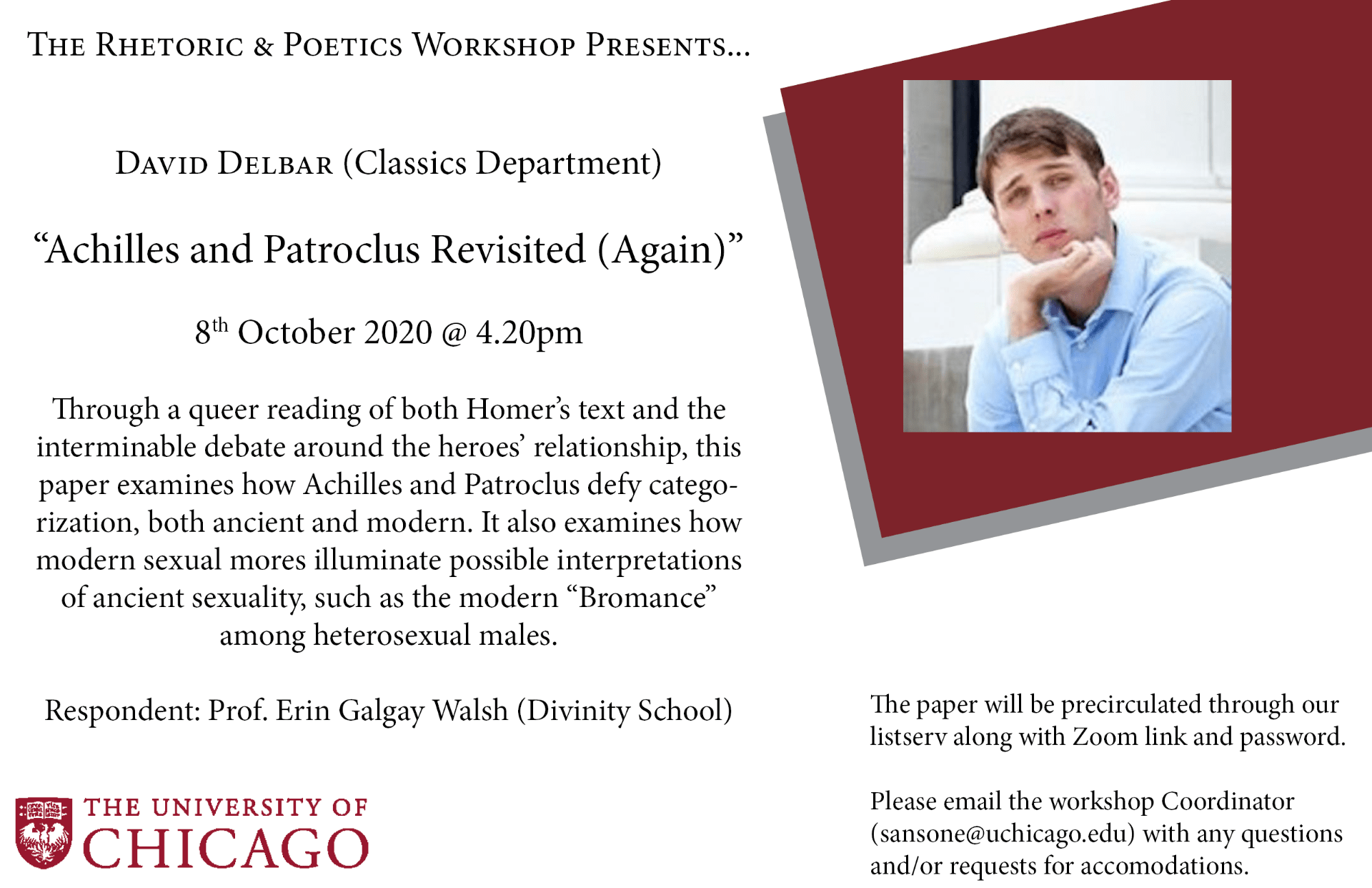Homer
Homeric Disputations (Spring 2020)
In these dark times, join our informal Homer discussion group. We will meet over Zoom, usually every week, for about an hour. Times may vary to accommodate different time zones and to give everyone a chance to join in on the fun!
Come meet new colleagues, and invite your friends. For time/date and Zoom info please see our UofC listserv for announcements, or check us out on twitter @rhetpoet! (PS You don’t have to be affiliated to participate!)
Thursday, October 5 –– Tobias Myers, “Evoking the Eternal in Iliadic Warfare”

Andrew Horne: Thursday 17th April 3:30 Classics 21
The Rhetoric & Poetics Workshop is proud to present
Andrew Horne
(The University of Chicago)
Hypothêkai, or Giving Instructions in Archaic Hexameters
Commands in Hesiod’s Works and Days are not commonly distinguished from gnomes or general wisdom, but they should be treated separately. Hesiodic commands are a distinct style of poetry that appears elsewhere in the archaic hexameter. The paper identifies a poetic genre of hexametrical commands and argues that this is the genre of hypothêkai, or wisdom instructions. Previous treatments of hypothêkai have focused on subject matter; this paper offers a formal approach, which accounts for the ancient occurrences of “hypothêkai” considered generic by Friedländer (1913) and Kurke (1990), and also introduces new evidence with usages in the Homeric scholia. Hesiod’s Works and Days is the monumental instance of the genre; shorter examples appear in Homeric speeches, from a single command with some special forms around it, to thirty-line speeches that are miniature parainetic poems. Many oracles fall under the genre as well. After establishing the genre, the paper explores its characteristic forms. The paper aims primarily to make progress in the formal analysis of the Works and Days, but opens possibilities, not here explored, for interpretations of Homer and others.
Thursday, 17th of April, 3:30pm in Classics 21
A reception will follow. Persons with a disability who feel they may need assistance are asked to contact Kathy Fox (702-8514) in advance.
To view the schedule of upcoming R&P events, please visit:
http://cas.uchicago.edu/workshops/rhetpoet/
Marcos Gouvea: Thursday, 27th of February, 3:30pm in Classics 21
The Rhetoric and Poetics Workshop is proud to present
Marcos Gouvea (The University of Chicago)
ut Homerus dicit:
invoking Homer to explain Vergil in Servius and Macrobius
Thursday, 27th of February, 3:30pm in Classics 21
A reception will follow. Persons with a disability who feel they may need assistance are asked to contact Kathy Fox (702-8514) in advance.
To view the schedule of upcoming R&P events, please visit:
http://cas.uchicago.edu/workshops/rhetpoet/
[Rhetoric-and-poetics] Alex Purves (10/3 Thursday 3:30)
The Rhetoric and Poetics Workshop is proud to present
Alex Purves (University of California, Los Angeles, Classics) on
“Odysseus’ Last Leap: Unfinished Action in Homeric Epic”
Thursday, October 3rd, 3:30 pm in Classics 21
A reception will follow.
Persons with a disability who feel they may need assistance are asked to contact
Kathy Fox (702-8514) in advance.
This paper starts at the end of the Odyssey, with the leap that Odysseus performs (οἴμησεν δὲ ἀλεὶς ὥς τ’ αἰετὸς ὑψιπετήεις, 24.538) directly after being called on by Athena to stop fighting. What is such an action doing at the very end of the poem? How does this expansive but incomplete gesture orient the poem towards closure? I pair this action with the famous moment from the beginning of the Iliad when Athena prevents Achilles from fully drawing his sword. In both cases, I argue, the heroes attempt to perform gestures that are at odds with the demands of the narrative, leading to a dynamic tension between plot and habitual action – especially in so far as the latter is structured by a kind of rebellious repetition.

